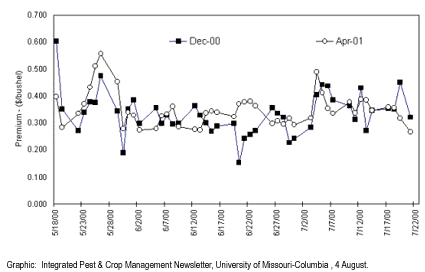

  |
|
|
Futures in Japan and On-Farm IP Costs (14 August - Cropchoice News) -- For all the talk about premiums, its hard to nail down any hard numbers. University of Missouri Extension economist Joe Parcell has been following the non-GMO soybean futures market in Japan, one of the best indicators of potential profits. Parcell just published a short piece in Missouri's IPM newsletter translating the premiums from yens and kilograms into dollars and bushels.  But for many producers, USDA's estimate of segregation costs may be too high - closer to a bad case scenario than an reliable budget line item. Some producers report that segregation is much cheaper, especially with experience. Ontario-based Snobelen Farms growers planted 60,000 acres of conventional, segregated beans this year. Snobelen's European customers pay a (US) 27 cents a bushel premium. At that level, well below the Tokyo average, Snobelen isn't just is operating profitably, it's growing its acreage and market. Segregation is getting easier every year says Mike Snobelen, "growers are coming up with ideas that are simpler and better." US identity preserved companies, like Iowa Soy Specialties, can be secretive about their systems, fearful of letting a profitable cat out of the bag and encouraging competition. But they are thought to operate at roughly the same level of premium as Snobelen, still profitable at well below the USDA's on-farm segregation cost estimate. Iowa Soy Specialties says that its clients are mainly in Europe but also include formerly all-biotech soy food maker Lumen Foods. Spokesman Dan VanSteenhuyse says that Iowa Soy's IP system is so good that "We had three groups ascend on us last year from Iowa, Illinois, and Michigan wanting to come visit, glean information and then go home to build their own copy cat facilities... I donít want a bunch of farmers across America finding out how to make my products." So how much premium is enough? Of course the more the better; but with cheap and effective on-farm IP practices, the equation can point in producer's favor. LINK: See Parcell's report here. SOURCE: University of Missouri at Columbia, Iowa Soy Specialties, Snobelen Farms | |